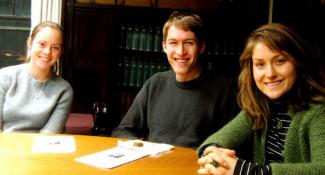The newly founded Harvard Interfaith Prison Education project is bringing together an interfaith coalition of Harvard graduate and undergraduate students committed to mentoring incarcerated women and men who are working toward their bachelor degrees through Partakers and Boston University's College Behind Bars program.
Founded in November 2012, Harvard Interfaith Prison Education (HIPE) was jointly organized by the Episcopal Chaplaincy at Harvard and Harvard Hillel. HIPE currently has 21 members from Harvard College, the Graduate School of Education, Hillel staff, Episcopal Chaplaincy staff, Harvard Divinity School, Harvard School of Public Health and the Harvard Law School. Although started by Episcopal and Jewish student communities, HIPE welcomes everyone irrespective of religious affiliations and its current members self-identify as Hindu, Muslim, Jewish, Christian and Buddhist. These members are divided into three teams, each assigned to mentoring a different incarcerated person.
HIPE was founded by Tiffany Curtis and Hilly Haber, growing out of a brainstorming conversation at a coffee shop in Harvard Square. Since they were both working in campus ministries at Harvard this year--Curtis at the Episcopal Chaplaincy at Harvard as its Micah Fellow for Social Justice, and Haber at Harvard Hillel as coordinator for graduate student programming--they wanted to find ways to do interfaith work together. Remembering a shared experience as members of Harvard Divinity School's prison mentoring team, they hatched the idea to form a similar interfaith prison team open to participants through the university. Curtis and Haber are coordinating the HIPE team and providing theological reflection and support for team members.
In a news release, Curtis explained how the process works: "Our team is one of 26 teams throughout Massachusetts that Partakers has connected with incarcerated students in the College Behind Bars program. We follow the protocol that Partakers has laid out for visits, and we had Arthur Bembury, the executive director of Partakers, come and do an orientation with our teams about visiting policy, expectations and procedures."
Members visit the prison facility in Norfolk in pairs (two visitors allowed per prisoner at a time), and the travel time provides an opportunity for reflection on the experience. In between visits, team members also write letters to those they are mentoring, primarily to coordinate visits.
"Letters are the main form of communication we have with the prisoners, so we need to coordinate visits well in advance. The letters are also important for catching up about different aspects of their education. Sometimes they will send an essay they wrote for class, or ask you to find some information for them for a project," Curtis said in the release.
Curtis described the visits as just sitting in the visitor room and talking. "For many of the folks in the program, this is one of the only contacts they have with the outside world, so they love the opportunity to have someone to talk to, especially someone who is passionate about education and is encouraging them in a very difficult endeavor of pursuing a college degree while incarcerated. You provide support and a listening ear about the papers they are writing, the projects they are working on, the ideas that are intriguing right now, their plans for classes for the next semester and so forth."
The Episcopal chaplain at Harvard, the Rev. Luther Zeigler, is himself a member of one of the visiting teams and said he has been thrilled by the project so far. "Especially as a former lawyer, and as a person of faith, I find prison reform and ministry a compelling social justice issue. In addition, this model of engaged interfaith ministry is something I am really passionate about pursuing in our chaplaincy. My first visit to Norfolk was not only a really wonderful opportunity to get to know and support my prisoner mentee, but it was also an inspiring time of interfaith sharing and conversation with the person from Hillel with whom I made the visit," he said.

